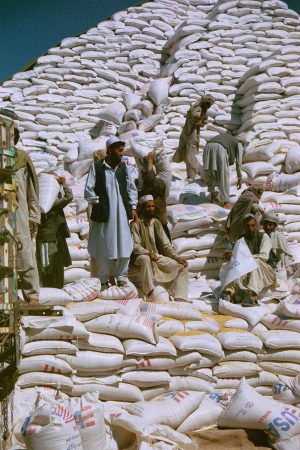The decision by the Trump administration to cut billions of dollars in aid to the world’s poorest regions will have far-reaching consequences. In Afghanistan, it may lead to increased Taliban repression of the population, while China stands poised to increase its influence in the country.
President Donald Trump justified his decision by claiming that the U.S. Agency for International Development (USAID) was run by “radical lunatics.” Elon Musk, who leads the government’s cost-cutting program, called it a “criminal organization.”
Despite the Taliban’s dominance, U.S. aid has played a vital role in Afghanistan, with $21 billion in humanitarian aid sent to the country through various agencies since the withdrawal of U.S. forces in 2021. The relative stability of Afghanistan’s economy largely depended on the continuation of these aid flows.
Although the Taliban repeatedly denied their dependence on and connection with the United States and its financial assistance, the immediate impact of this decision became apparent when Afghan government employees were informed that their salaries had been suspended for the next three months due to “technical” reasons.
To make up for the shortfall, the Taliban government is likely to increase Zakat and Usher religious taxes, hugely increasing pressure on the already struggling Afghan population.
While nearly all U.S. cash assistance, sent weekly under the name of humanitarian support, was controlled and directed by the Taliban regime, the suspension of this aid immediately impacted food and commercial goods prices in Afghan markets. The value of the Afghan currency dropped by 14 Afghanis against foreign currencies after the decision.
The United Nations estimates that 22.9 million people – almost half of Afghanistan’s population – will need humanitarian assistance this year. State hospitals, especially children’s and women’s units, are likely to be particularly badly hit by the withdrawal of aid.
Since the chaotic U.S. withdrawal from Afghanistan in 2021, the U.S. State Department and USAID continued to fund key sectors in Afghanistan, including health, education, agriculture, and food security, as well as supporting civil society and media. All of that aid has now been suspended.
Meanwhile, China, which has close ties with the Taliban, has significantly increased its presence in Afghanistan, especially in the diplomatic, economic, commercial, mining investments, and tourism sectors.
China initially welcomed the Taliban’s rise to power and viewed the NATO withdrawal as an opportunity to strengthen its regional influence. The Taliban have provided China with unprecedented access to Afghanistan’s mineral resources. In March 2022, China’s foreign minister visited Kabul, with China becoming the first country to go through all diplomatic protocols to accept the Taliban’s ambassador.
In August 2023, Mullah Abdul Kabir, the Taliban’s deputy prime minister, announced the group’s support for China’s trillion-dollar investment program, the Belt and Road Initiative (BRI). In October 2024, China announced a tariff exemption for Afghanistan, which not only represents a key part of the country’s economic support for the Taliban but also sets the stage for deeper Chinese influence in Afghanistan’s trade.
Although it is unlikely that China will take on all the costs previously covered by the U.S., China may selectively seize some of the opportunities created and exploit the existing gaps to advance its own interests.
China has spent large amounts to gain control of foreign media outlets, especially in Africa, in an effort to control public discourse in regions where it is investing as part of BRI. Inside Afghanistan, some media infrastructures remain active, presenting an ideal opportunity for China to gain influence over their content as funding dries up.
Meanwhile, pro-democracy media outlets broadcasting from outside Afghanistan now face an immediate threat to their survival. Officials from one Afghan media outlet, which has been active for nearly two decades and mostly relied on U.S. aid, told one of the authors of this article that they may soon have to cease operations.
China may also target some educational institutions and universities previously supported directly or indirectly by the United States. In such a scenario, China’s influence on Afghanistan’s education policies will increase over time.
Influence over media and education is a key part of China’s soft power strategy, which aims to curb any criticism of its policies while challenging established norms such as the universality of human rights.
In addition, the presence of extremist groups in Afghanistan has also raised serious security concerns for Beijing. Since the Taliban’s takeover of Afghanistan, the Islamic State’s Khorasan branch has claimed responsibility for several attacks against Chinese citizens in Afghanistan and Tajikistan.
The Chinese Party’s United Front Work Department (UFWD), often referred to as China’s “magic weapon,” will be closely monitoring developments in Afghanistan. As one of the primary tasks of the UFWD is to influence public discourse on sensitive issues like Taiwan, Xinjiang, and Tibet, controlling Afghanistan’s media could present an attractive opportunity for this body.
China can help strengthen and sustain the Taliban for its own benefit, while also using its influence to suppress those advocating for democracy in the region – something that could be seen as a “win-win” for both. It’s hard to argue that such an outcome is anything but a loss for the United States.

































